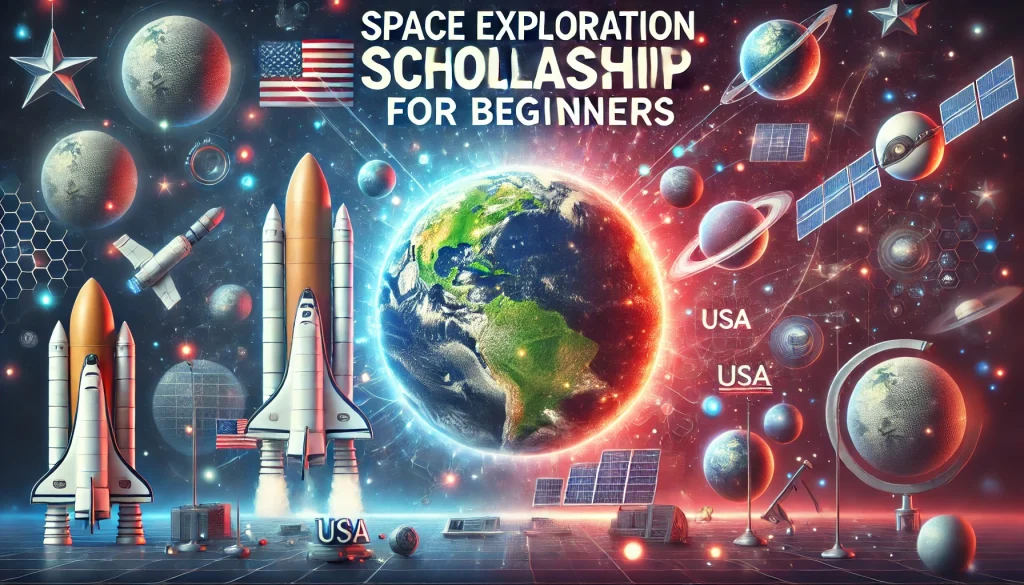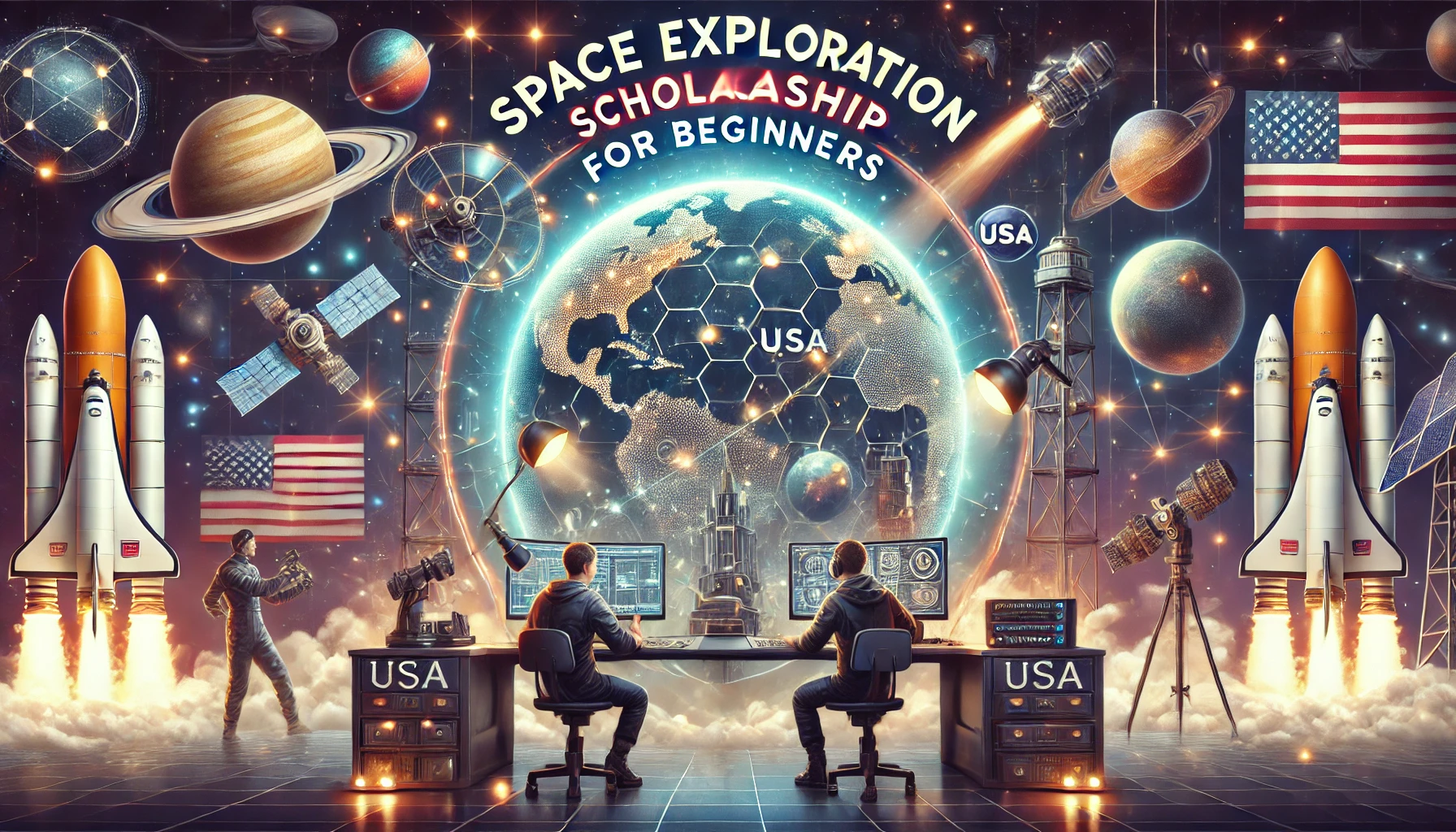Did you know that the Space Exploration Scholarship for Beginners is an exciting field? Many kids and adults dream of becoming astronauts or working in space research. But how do you start? One great way to begin your journey is through a space exploration scholarship. These scholarships help students learn about space and even allow them to work on real space projects. This article will explore different scholarships available for beginners and how they can help you achieve your dreams.
Why Space Exploration?
Space exploration helps us learn about the universe. It also brings new technology and knowledge that can improve our lives on Earth. Scientists study planets, stars, and other celestial bodies to understand how the universe works. They also develop new tools and techniques that can be used in many fields like medicine, engineering, and environmental science.
Types of Space Exploration Scholarships
1. NASA Scholarship Programs
NASA (National Aeronautics and Space Administration) is one of the most well-known space organizations in the world. They offer several scholarships for students interested in space exploration.
NASA Space Grant Scholarship
- Offer: Provides financial aid and internship opportunities.
- Cost: Free to apply, but you need to be a U.S. citizen and maintain a good academic record.
NASA Aeronautics Scholarship Program
- Offer: Supports students pursuing aeronautics and related fields.
- Cost: Free to apply. Selected students receive up to $25,000 per year for tuition and $10,000 for summer internships.
For more details, visit NASA Scholarship Programs.
2. Space Foundation Scholarships
The Space Foundation is a non-profit organization that promotes space education. They offer various scholarships to help students get started in space exploration.
International Student Art Contest Scholarship
- Offer: Open to students worldwide. Winners receive cash prizes and their artwork is displayed at Space Foundation events.
- Cost: Free to enter.
Alan Shepard Technology in Education Award
- Offer: Recognizes teachers and students who use technology in innovative ways.
- Cost: Free to apply. Winners receive grants and recognition at the Space Symposium.
For more information, visit Space Foundation Scholarships.
3. SEDS (Students for the Exploration and Development of Space) Scholarships
SEDS is an organization run by students for students. They offer scholarships to support young people interested in space exploration.
SEDS USA Scholarships
- Offer: Financial aid and project funding for student members.
- Cost: Free for SEDS members to apply. Membership fees for SEDS vary by chapter.
SEDS National Award
- Offer: Recognizes outstanding student achievements in space research.
- Cost: Free for SEDS members to apply.
For more information, visit SEDS Scholarships.
4. The Mars Society Scholarships
The Mars Society is dedicated to the exploration and settlement of Mars. They offer scholarships to students who are passionate about Mars research.
Mars Society Scholarship
- Offer: Financial support for students conducting Mars-related research.
- Cost: Free to apply. Applicants must submit a research proposal.
Red Planet Essay Contest
- Offer: Open to students of all ages. Winners receive cash prizes and publication opportunities.
- Cost: Free to enter.
For more details, visit The Mars Society Scholarships.
How to Apply for Scholarships
Applying for scholarships can be a competitive process, but with the right preparation, you can increase your chances of success. Here are some tips to help you:
- Research Scholarships: Start by researching different scholarships and their requirements. Make a list of the ones that match your interests and qualifications.
- Prepare Your Application: Gather all the necessary documents, such as transcripts, letters of recommendation, and personal statements. Make sure to follow the application instructions carefully.
- Highlight Your Achievements: In your application, highlight your achievements, skills, and experiences related to space exploration. Show how passionate you are about the field.
- Submit Early: Don’t wait until the last minute to submit your application. Submitting early shows that you are organized and serious about the scholarship.
- Seek Help: If you need help with your application, don’t hesitate to ask your teachers, mentors, or family members for assistance.
Benefits of Space Exploration Scholarships

Receiving a space exploration scholarship can provide many benefits:
- Financial Support: Scholarships can help cover the cost of tuition, books, and other educational expenses.
- Experience: Many scholarships offer internship opportunities, allowing you to gain hands-on experience in the field.
- Networking: Scholarships can help you connect with professionals and other students who share your interests.
- Recognition: Being awarded a scholarship is a great achievement and can enhance your resume and college applications.
More Space Exploration Opportunities
Apart from scholarships, there are many other opportunities for beginners to get involved in space exploration. Here are some exciting programs and competitions that can help you gain more experience and knowledge.
5. STEM Programs and Camps
STEM (Science, Technology, Engineering, and Mathematics) programs and camps are great ways to learn more about space exploration. These programs often include hands-on activities, workshops, and lectures by space professionals.
Space Camp
- Offer: An immersive camp experience where students can train like astronauts, build rockets, and participate in simulated space missions.
- Cost: Prices vary. A typical week-long camp can cost around $1,299, but scholarships and financial aid are available.
Destination Imagination
- Offer: A global program that encourages students to solve STEM challenges, including space-related problems.
- Cost: Registration fees vary by region. Teams can apply for grants to cover costs.
For more information on Space Camp, visit Space Camp and for Destination Imagination, visit Destination Imagination.
6. Robotics Competitions
Robotics competitions are another excellent way to get involved in space exploration. These competitions often involve designing and building robots to complete specific tasks, which can include space-related challenges.
FIRST Robotics Competition
- Offer: Teams of students work together to build and program robots for competitions.
- Cost: Initial team registration costs about $6,000. Additional costs for materials and travel may apply, but there are grants and sponsorships available.
VEX Robotics Competition
- Offer: A global competition where students design and build robots to compete in various challenges.
- Cost: Registration fees start at $150 per team. Costs for robot kits and travel are extra, but scholarships are available.
For more details on these competitions, visit FIRST Robotics and VEX Robotics.
7. Online Courses and Workshops
Many online platforms offer courses and workshops on space exploration. These can be a flexible and affordable way to learn more about space science and technology.
edX Space Exploration Courses
- Offer: Free and paid courses on various space-related topics, including astronomy, astrophysics, and space engineering.
- Cost: Many courses are free to audit. Certificates and full access to materials typically cost between $50 to $200 per course.
Coursera Space Courses
- Offer: Courses from top universities and institutions on space exploration, satellite technology, and more.
- Cost: Free to audit. Certificates and graded assignments cost between $29 to $99 per course.
For more information, visit edX Space Exploration and Coursera Space Courses.
8. Space-Related Student Clubs
Joining a space-related student club can provide you with additional learning opportunities and a community of like-minded peers. These clubs often organize events, guest lectures, and projects.
Astronomy Club
- Offer: Activities include stargazing nights, telescope workshops, and guest lectures by astronomers.
- Cost: Membership fees vary by club, often ranging from $10 to $50 per year.
Rocketry Club
- Offer: Students design, build, and launch rockets. Clubs often participate in national and international rocketry competitions.
- Cost: Membership fees vary. Additional costs for materials and competition fees can range from $100 to $500 per year.
For more information, check your school’s clubs or local community organizations.
9. Science Fairs and Expos
Participating in science fairs and expos can be a fantastic way to showcase your space-related projects and research. These events often provide prizes, scholarships, and recognition.
Intel International Science and Engineering Fair (ISEF)
- Offer: The world’s largest international pre-college science competition. Students present their research and compete for scholarships and awards.
- Cost: Entry fees vary. Some schools and local organizations offer sponsorships.
Google Science Fair
- Offer: An online science competition where students can submit their projects for a chance to win scholarships and prizes.
- Cost: Free to enter.
For more details, visit Intel ISEF and Google Science Fair.
Building a Strong Foundation in Space Exploration
Getting involved in space exploration from a young age can set you up for a successful career in this exciting field. Here are some additional tips to help you build a strong foundation:
- Stay Curious: Always ask questions and seek out new knowledge about space. Read books, watch documentaries, and follow the latest space missions and discoveries.
- Develop STEM Skills: Focus on developing your skills in science, technology, engineering, and mathematics. These skills are essential for a career in space exploration.
- Get Hands-On Experience: Participate in as many hands-on activities as possible, such as building models, conducting experiments, and working on projects.
- Connect with Mentors: Find mentors who can guide you and provide advice on your journey. Teachers, professors, and professionals in the space industry can be great mentors.
- Stay Involved: Join clubs, attend events, and participate in competitions to stay engaged and connected with the space exploration community.
By following these tips and taking advantage of the many opportunities available, you can start your journey into space exploration and work towards achieving your dreams. Remember, the sky is not the limit—reach for the stars!
Conclusion
Space exploration scholarships are a fantastic way to start your journey into the world of space science. They provide financial support, valuable experience, and opportunities to work on exciting projects. Whether you dream of becoming an astronaut, engineer, or scientist, these scholarships can help you reach for the stars. So, start researching and applying today, and who knows? You might be the next person to explore the wonders of space!
Good luck, future space explorers!

